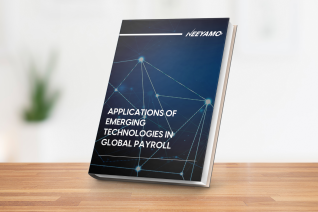Establish your presence globally with Neeyamo as we help you go beyond borders to manage your international payroll and hire new talent in Belgium.
Overview
While the notion of a country operating without a government may seem alarming to some, it has almost become a routine for Belgium. From 2010 to 2011, Belgium managed to function for 589 days without a government, and in 2020, it surpassed its record by enduring 652 days without a federal government. However, one might be mistaken to assume that this led to chaos, as the people of Belgium are remarkably skilled and resourceful. Despite being a highly diverse nation, its citizens are known for their cooperation and self-sufficiency, which are excellent qualities to find in employees.
Do your organization's expansion plans require hiring employees in a country with a determined and self-reliant workforce? Do you lack a physical entity in the country – a key requisite to hire local talent? Neeyamo – one of the top Global payroll providers, assists organizations worldwide with onboarding and managing employees in Belgium - processing payroll, managing local compliance requirements, benefits, and more.
Tools And Instances
Facts And Stats
Capital
Brussels
Currency
Euro (EUR)
Official Language
Dutch, French, and German
Fiscal Year
1 January - 31 December
Date Format
DD/MM/YYYY
Country Calling Code
+32
Time Zone
Central European Time Zone (UTC+01:00)
Global Payroll
Overview
What is payroll?
Payroll is the list of compensation to be paid to employees of a company or organization for a set period or date. Global payroll provider companies allow organizations to outsource their payroll, allowing employers to focus on other aspects of their business.
What is Global Payroll?
Handling payroll for a widespread workforce can pose a significant challenge for any organization, and the added complication of compliance can make things worse. If companies spend more time processing payroll, it directly impacts day-to-day operations and their overall productivity. The solution to this is global payroll outsourcing.
What is a global payroll system?
Over the years, Neeyamo – Global Payroll Services has observed these complexities and strived to provide global payroll solutions through a single technology platform – Neeyamo Payroll. Neeyamos global payroll systems ease the process for companies looking to outsource their global payroll requirements and aid them in maneuvering the tricky payroll system in Belgium. Neeyamos payroll software provides the perfect solution for all your global payroll needs – for employees working in primary geographies, the long-tail region, remote or internationally located.
How is payroll calculated?
Neeyamo acts as your personalized Payroll Calculator. Ensuring adherence to local regulatory requirements using multi-level controls. Providing timely and accurate payroll, courtesy of our experts worldwide and using a tech-based integrated smart helpdesk solution with seamless support experience manned by payroll experts - Neeyamo has all your payroll needs covered.
Payroll Associations
The Global Payroll Association (GPA) is instrumental in supporting individuals and organizations engaged in payroll and its related functions. These associations offer many advantages that foster professional growth, facilitate networking prospects, encourage knowledge exchange, and promote industry advocacy.
Payroll Taxes
Payroll tax is the percentage amount retained from an employee's salary and paid to the government to invest in the welfare of the general population.
Employee Taxes
Employee Contribution
In Belgium, individuals who are residents are subject to communal taxes, which are calculated based on a range of rates varying from 0% to 9% of their income tax obligations. On average, the rate for communal taxes is 7%.
On the other hand, non-residents are required to pay a fixed surcharge of 7%. It's important to note that communal taxes may also be imposed on foreign-source income that is typically exempt from taxation in certain situations.
Social Security contribution: 13.07%
The following is the personal income tax for 2023:
| 0.00 EUR – 15,200 EUR | 25% |
| 15,201 EUR – 26,830 EUR | 40% |
| 26,831 EUR – 46,440 EUR | 45% |
| 46,441 EUR and above | 50% |
Employer Taxes
Employer Contribution
Social Security contribution: 27%
The employer's social security contributions on the company allowance percentages are increased by a factor of 1.047 for the year 2023 and 1.094 for the year 2024.
Employees who use a bicycle for commuting to work are entitled to a bicycle allowance paid by the employer.
Only employees who regularly commute to work by bicycle are entitled to a bicycle allowance of 0.27 euros per kilometer, and this will be paid.
Payroll Cycle
Overview
The Pay cycle is a notable feature of it that provides a sense of accountability for an employee to be paid consistently for their work.
Frequency
Payroll frequency is monthly for the work completed between the first and last day of the month. The last day of the month is usually the pay date, but it can be as late as the 15th of the following month.
13th Month Cycle
The 13th month is given out in December and the 14th month is given out in July as a double salary or (92% in addition to wages)
Global Work
Overview
What is EOR?
An Employer of Record services provider helps you get rid of the hassle of handling the complexities that come with setting up a new employee in remote locations. They act as the legal employer, facilitate salary payments, and handle everything from health insurance. Payroll taxes and employee benefits to comply with local tax laws and regulations.
This ensures that the client company can focus on the employee’s everyday tasks safely in the knowledge that they have a cost-effective solution as they continue their global expansion.
The EOR industry allows organizations to focus on collaborating with employees in Belgium for operational tasks, with the knowledge that they have a cost-effective solution to support their Global Payroll & Employer of Record - Belgium requirements as they continue their global expansion.
HR Mandates and Practices
Minimum Wage
Effective November 1, 2023, Belgium's standard monthly minimum wage increases.
- The standard minimum wage is now 1,994.18 euros per month, up from 1,954.99 euros.
- Hourly minimum wages for 38, 39, and 40-hour workweeks have also increased to 12.1104 euros, 11.7999 euros, and 11.5049 euros, respectively.
- This standard minimum wage applies to all employees aged 18 and above unless they are subject to an industry-specific minimum wage.
- Employees aged 17 may receive 73% of the standard minimum wage, while those aged 16 or under can be paid 67%.
- Employees aged 18, 19, or 20 with a student contract may receive 79%, 85%, or 90% of the standard minimum wage, respectively.
Overtime
Overtime is considered work performed more than 9 hours a day or 40 hours a week or above the lower working hours limits set by a collective bargaining agreement. The weekly working hours can be reduced to 38 hours by the working hours limit set by a collective bargaining agreement.
The working hours limits for including overtime shall be a maximum of 11 hours per day and 50 hours per week.
Employers cannot require employees to work more than 78 overtime hours in three months or 91 overtime hours in one year.
- Overtime is strictly regulated and, in most cases, prohibited.
- Employees who work overtime are paid 150% of their regular pay during the week and 200% of their regular pay on weekends and holidays.
- Some jobs, such as sales, management, and trust roles, are exempt from overtime and working hours rules.
Data Retention Policy
The following documents must be maintained by employers for a period of five years:
- individual accounts,
- general and special personnel register,
- employment contracts for students and
- employment contracts for employees who telework.
- right to disconnect:
With effect from April 1, 2023, employers should monitor whether a sectoral collective agreement on the right to disconnect is to be signed within its joint committee, in the absence of which this should be introduced via a collective labor agreement at a company level in consultation with the unions or via the work regulations.
Whistle Blowing update :
With effect from December 17, 2023 (if the company employs between 50 and 249 employees) and from February 15, 2023 (if the company employs more than 249 employees), the legislation provides for the protection of whistleblowers against retaliation and specific proceedings in case whistleblowers suffer retaliatory measures, they should also ensure that arrangements are in place to protect against retaliatory actions. Employers who fail to fulfill the obligations under the new law or who retaliate against or fail to respect the confidentiality of whistleblowers risk sanctions at level four of the Social Criminal Code, i.e., up to three years imprisonment and a fine of up to €48,000.00 per infringement.
Hiring and Onboarding Requirements
Hiring
In terms of the Hiring and Onboarding requirements, employees are categorized into EEA and Non-EEA.
For EEA:
Citizens of any of the EEA(European Economic Area) countries are free to travel and work without a work permits.
For Non-EEA:
Every non-EEA person must have a work permit with them (exceptions include students, spouses,s or EEA Nationals). There is a different permit, called the single permit, given by Belgium that includes residence and work permits. However, there is a limitation to the accessibility of single permits, which are only provided to a specific type of worker.
Onboarding
Important documents required from the concerned person would be:
- Copy of their passport
- Copy of their degrees
- Medical certificate
- Criminal record
- Employment contract from the company to the worker
- Proof of health insurance coverage
- Power of Attorney (POA) for the worker of the foreign employer
If there’s a document in another language, then it needs to be translated by an official translator.
Probation
There can be a probationary period of up to two weeks for blue-collar workers, and anywhere between one and six months for white-collar workers if the annual wage does not exceed EUR 36–37,000.
White-collar employees earning more than this may have a trial period of up to 12 months.
Employment Contracts
Effective from May 8, 2023, a new act seeks to provide employment security to workers on insecure contracts. If the two-year time is exceeded, the open-ended employment contract regulations should be followed.
Leave
Public Holidays
There are 12 public holidays in the year. According to the Joint Labour Committee, an additional holiday may be granted.
January 1: New Year's Day
April 9: Easter Sunday
April 10: Easter Monday
May 1: Labor Day / May Day
May 18: Ascension Day
May 28: Whit Sunday
May 29: Whit Monday
July 21: Belgian National Day
August 15: Assumption of Mary
November 1: All Saints' Day
November 11: Armistice Day
December 25: Christmas Day
Annual Leave
An employee's entitlement to vacation is based on the amount of time worked in the preceding year. An employee who worked full-time is entitled to four weeks of paid vacation in the following year. Employees who have not worked a full year are entitled to vacation prorated for the days actually worked.
As of leave year 2024, changes to Belgian leave legislation will allow certain employees to carry over statutory annual leave to the following calendar year. Furthermore, the right to 4 weeks of effective statutory annual leave will be guaranteed by permitting leave days to be taken at a later period in the event of a work interruption (such as illness)
Vacation time for blue-collar workers is paid by the holiday fund or the National Office for Annual Leave, which determines payments based on employee salaries from the previous year. Vacation pay is slightly more than 15 percent of employee salaries. White-collar employees are paid directly by employers for vacation time, including both the vacation pay owed and a supplement equal to 1/12 of 92 percent of employees' gross salaries.
Sick Leave
A blue-collar worker who has worked for an employer for at least 30 days prior to an illness or injury is entitled to take up to 30 days of sick leave with partial pay. A white-collar worker is entitled to take up to 30 days of sick leave at 100 percent pay.
Maternity Leave
A female employee is entitled to six weeks of paid prenatal maternity leave immediately prior to the expected date of childbirth or eight weeks prior to that date if she is expecting more than one child. She must take maternity leave beginning no later than seven days before the due date; the remainder of the prenatal leave is optional. If she does not take the full amount of available prenatal leave, she may extend her post-childbirth leave by the amount of unused prenatal leave.
The employee is entitled to nine weeks of postnatal paid maternity leave plus any remaining prenatal maternity leave. The employee also may choose to stockpile two weeks of unused prenatal maternity leave and take that leave at any time during the first eight weeks after she returns to work.
Paternity Leave
A father is entitled to take ten days of paid paternity leave within four months after the birth of his child. The first three days of leave are paid by the employer; the remainder is paid by social security.
A father may take the remainder of the mother's postnatal leave to care for his newborn child if the mother is hospitalized or dies during maternity leave.
Parental Leave
Any employee, male or female, is entitled to take parental leave of up to 4 months at any time during the first 12 years after the birth or adoption of a child.
Every full-time employee can continue to work part-time for a period of 8 months (‘half-time parental leave’); the eight-month period can be split at the employee’s discretion. However, a duration of two months or a multiple of this must be taken into account for each application. There is also a right to parental leave in the case of adoption.
Other Leave
Employees are entitled to educational leave, training leave, family care leave, family events and unforeseen events leave, and time credits.
It can be taken under the collective agreement.
Termination
Notice Period
Notice periods are dependent on the length of service/employment:
Length of service Amount of notice
- Less than 3 months of employment 2 weeks’ notice
- 3-6 months of employment 4 weeks’ notice
- 6-9 months of employment 6 weeks’ notice
- 9-12 months of employment 7 weeks’ notice
- 12-15 months of employment 8 weeks’ notice
- 15-18 months of employment 9 weeks’ notice
- 18-21 months of employment 10 weeks’ notice
- 21-24 months of employment 11 weeks’ notice
- 24-36 weeks of employment 12 weeks’ notice
- 36-48 months of employment 13 weeks’ notice
- 48-60 months of employment 15 weeks’ notice
- 60 months-19 years of employment 60 weeks’ notice + 3 weeks for every year exceeding 5 years
- 20-21 years of employment 62 weeks’ notice + 1 week for every year of employment
It is also possible to pay in lieu of notice.
With effect from October 28, 2023, the notice period in case of resignation by the employee will be limited to 13 weeks. Specific provisions pertaining to white-collar employees would be abolished as they violate the principle of equality.
Severance Pay
Severance pay is only paid when an employer abruptly terminates an employment agreement. In this case, the severance pay would be equal to what the employee would have earned if they had been given notice.
Visa
Overview
EU Citizens:
The following are the rights enjoyed by EU Citizens:
- Freedom to move to another EU Country without a work permit
- Continue to live in the country even after employment is done
- Exercise equal opportunities and working conditions along with all social and tax benefits
There is a necessity to register with the local authorities of Belgium upon arrival. If the need to stay is more than 3 months, applying for a registration certificate is a must.
Non-EU Citizens:
Non-EU Citizens definitely require a work permit, within which there is a short-term visa ( for less than 90 days) and long-term visa (For more than 90 days). Importantly, for long term, the employer needs to apply for the work permit one year in advance.
Employee Background Checks
Legal and Background Checks
In Belgium, background checks only assess a potential candidate's professional background. However, if the information is available on a public platform such as social media, an employer is free to refer to and derive meaning as much is appropriate.
Employers can also refer the corresponding person from the previous job if the employer wishes to know further details about the newly hired talent.
It is unlikely for a thorough checkup of criminal records on an employee. Usually, this is relevant for regulated professions under the Federal Public Service of Justice.
Limitations on Background Checks
Extensive background checks on employees are not common in Belgium. They should be limited to the strict necessity of assessing the applicant’s professional skills relevant to the job offered.
The most common background checks related to education, experience (past employment records), criminal records for certain occupations (e.g., in the security sector), confirmation that the applicant has the appropriate permission to work in Belgium, health and medical checks, and more and more commonly, social media checks, despite the potential that such searches can come into conflict with the right to privacy of the applicant. However, a lot will depend on the public status of the information.
Last updated on September 29, 2023
If you have any queries or suggestions, reach out to us at irene.jones@neeyamo.com







